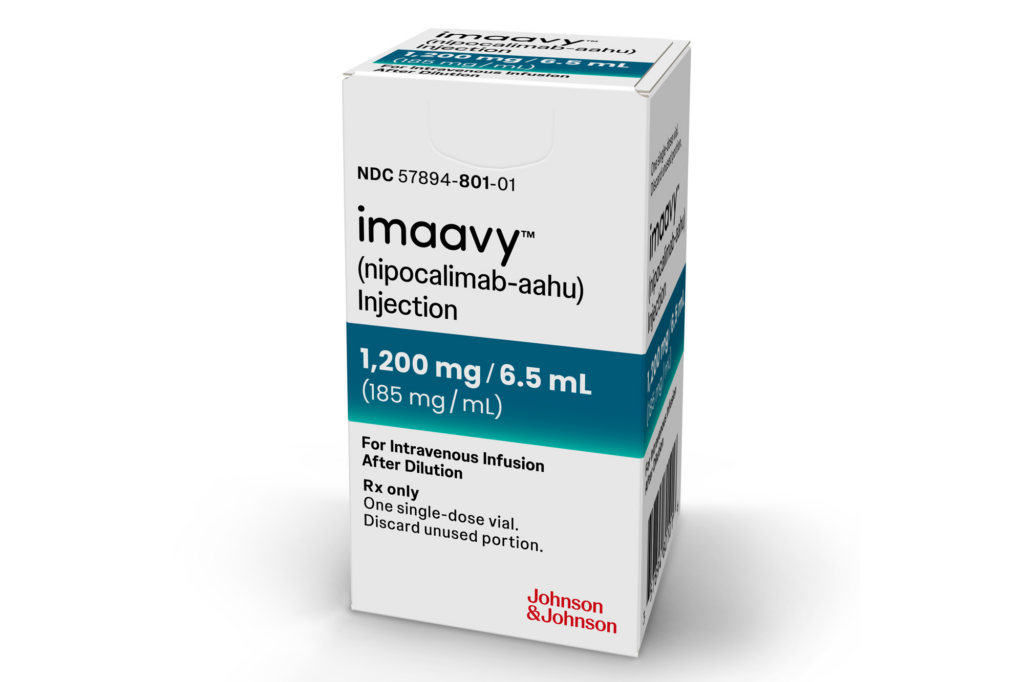Johnson & Johnson’s (J&J’s) Imaavy (nipocalimab-aahu), a novel FcRn-blocking monoclonal antibody is now FDA-approved for the treatment of generalized myasthenia gravis (gMG) in adults and pediatric patients aged 12 and older who test positive for anti-AChR or anti-MuSK antibodies.
AChR (acetylcholine receptor) and MuSK (muscle-specific kinase) autoantibodies — antibodies that mistakenly target and attack the body’s own healthy tissues — are the two most common types found in gMG.
The approval was supported by data from the Phase III Vivacity-MG3 study and the ongoing Phase II/III pediatric Vibrance-MG trial.
A chronic autoimmune neuromuscular disease, gMG affects around 100,000 people in the US, often beginning with eye muscle weakness and progressing to difficulties in speech and mobility.
gMG can severely impact daily life — many patients report sudden loss of speech, difficulty chewing or being unable to hold their head up. Even basic tasks can lead to fatigue and social withdrawal, compounding the disease burden.
Imaavy was administered intravenously, beginning with a 30 mg/kg loading dose followed by 15 mg/kg infusions every two weeks, and was given alongside standard of care treatments in both adult and pediatric trials.
In the Vivacity-MG3 study, adults receiving nipocalimab with standard of care showed sustained symptom relief and improved disease control over 24 weeks, outperforming placebo across both the MG-ADL (Myasthenia Gravis-Activities of Daily Living) and QMG (Quantitative Myasthenia Gravis) scoring systems. These measure how gMG symptoms affect everyday tasks like chewing and walking, and assess muscle strength through clinical testing, respectively.
Gains in daily function were not only statistically significant but were maintained for 20 months in the open-label extension, where patients continued to show reduced disease activity without a drop in response over time. Among the 199 enrolled patients, IgG antibody levels were reduced by 75% from baseline — a key factor in disease progression.
In the Vibrance study, seven adolescents aged 12 to 17 saw a 69% drop in total IgG over 24 weeks, with corresponding improvements in MG-ADL and QMG scores. The safety profile in adolescents was consistent with that seen in adults.
Imaavy works by targeting the neonatal Fc receptor (FcRn), which extends the lifespan of IgG antibodies. By blocking FcRn, the drug speeds up the clearance of pathogenic autoantibodies that impair nerve-to-muscle communication, causing gMG symptoms such as muscle weakness and difficulty swallowing or breathing.
The drug received Priority Review and is the first FcRn blocker approved for both AChR+ and MuSK+ gMG across adult and adolescent populations.
Across both trials, common side effects included infections and infusion-related reactions like headache, chills and nausea. In rare cases, allergic responses such as anaphylaxis were observed. Patients are advised to avoid live vaccines while on treatment.
J&J is also advancing nipocalimab for other autoantibody-driven diseases, including warm autoimmune hemolytic anemia, fetal and neonatal alloimmune thrombocytopenia and Sjögren’s disease.
The gMG treatment landscape recently expanded with a pre-filled syringe format for Vyvgart Hytrulo, an FcRn blocker, developed by Netherlands-based biotech Argenx. The self-injectable option gives patients greater flexibility in managing treatment outside clinical settings.
Meanwhile, China-based RemeGen announced Phase III results for telitacicept, whose dual-targeting approach acts on both B cells and the BLyS/APRIL pathway — a mechanism distinct from FcRn inhibition. RemeGen reported that 98.1% of patients achieved a clinically meaningful drop in MG-ADL scores.
With demand for immunotherapies rising, the gMG market is expected to surpass $2.75 billion by 2032. J&J has signaled that its broader immunology strategy will support therapies targeting autoantibody-driven diseases, including those mediated by FcRn pathways.
If you want your company to be featured on Xtalks.com, please email [email protected].












Join or login to leave a comment
JOIN LOGIN